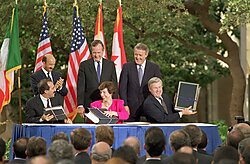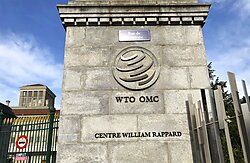-
Support for globalization and opposition to global government are not contradictory positions.
-
World government would be dangerous because people harmed by its policies could not “vote with their feet” against it.
-
World government would exacerbate the problem of voter ignorance that bedevils democracy at the nation-state level.
-
World government could degenerate into authoritarianism or even totalitarianism, with potentially catastrophic results.
-
We don’t need world government to solve the world’s problems.
The debate over world government and “global governance” typically pits cosmopolitan supporters of globalization against nationalist champions of state sovereignty. The latter fear world government because of the threat it poses to nationalism and the autonomy of nation-states. They also typically view free trade and international migration with great suspicion.
However, one need not be a nationalist to oppose world government. I am a cosmopolitan supporter of free trade and an advocate of a strong presumption in favor of open borders immigration. In addition, I am no fan of nationalism, which I consider to be one of the greatest evils of the modern world.
Yet I also take a dim view of world government and other similar proposals. These positions are not contradictory. Indeed, they are mutually reinforcing. Precisely because I see great value in free migration and the opportunity to “vote with your feet,” I oppose the creation of a global state whose authority would be almost impossible to escape.
A world government would close off opportunities for foot voting. It would also undermine valuable interjurisdictional competition and exacerbate some key weaknesses of the democratic process. In the worst-case scenario, it could lead to the establishment of a global tyranny from which there may be no escape. Despite the claims of advocates, a world government is also probably not necessary to solve the world’s major problems. Indeed, it might even exacerbate some of those dangers.
Why the Debate over World Government Matters
Concern about the perils of world government may seem ridiculous at this point in history. Critics of world government always run the risk of looking like paranoid conspiracy theorists who believe that the UN, the World Economic Forum, the Council on Foreign Relations, or the Zionist-Masonic conspiracy is plotting to take over the world. This may be even more true in light of recent events such as the Russia-Ukraine War and the rise of right-wing nationalist movements in the United States and several European countries. In the wake of these developments, the debate over world government may seem like an irrelevancy that can safely be left to utopians and conspiracy theorists.
It is certainly true that world government is unlikely to be established in the near future, and that recent political events have made it less likely still. No black helicopters are going to land on your lawn any time soon—at least not ones sent by any incipient world government! Nor, despite the rantings of conspiracy-mongers, is there going to be a “great reset” that establishes a world state.
But it is important to look beyond the immediate political moment. The nationalist surge may fade over time. Donald Trump’s brand of xenophobic populism—and that of his imitators abroad—may turn out to be one of the last gasps of a fading past, rather than the wave of the future.
Survey data indicate that younger voters in both the United States and Europe are less nationalistic than their elders. For example, younger US voters are much more pro-immigration, and younger European ones more supportive of both immigration and the international institutions of the European Union. The same is true of highly educated voters relative to less-educated ones—an important trend at a time when education levels continue to rise. And some influential opinion leaders and political elites are warming to the idea of world government and strong global governance because of fear caused by international problems such as global warming, pandemics, and recurring financial crises. They believe that such institutions are necessary to address the world’s most serious challenges.
While the establishment of world government is highly unlikely anytime soon, trends favoring it could potentially accelerate over time, while opposition might gradually wane. At the very least, it is an idea worthy of serious consideration.
If we come to a better understanding of its dangers now, we are more likely to avert the peril before it becomes a serious threat. And sadly, that danger could become real if global challenges persist and if the movement for world government makes significant progress as a result.
In ascending order of gravity and descending order of likelihood, world government poses three major dangers: stifling of diversity and competition; elimination of the possibility of emigration and “voting with your feet”; and establishment of global despotism, perhaps even culminating in totalitarianism. These dangers are exacerbated by the ways in which a world government might deepen the impact of a key weakness of democracy at the national level: widespread political ignorance.
Stifling Diversity and Competition
The whole world is far more diverse than any one nation-state. A world government will necessarily have to trample some of this diversity in order to impose its one-size-fits all policies. If it does not do so, there would be no point in establishing a world government in the first place. Given the incredible diversity of the world’s people and cultures, it will be difficult to adopt any major policy that does not inflict severe harm on at least some groups. The problem of dissident minorities has been difficult to address within individual nation-states. It would be far more severe under a world government.
Stifling diversity might also undermine beneficial competition between nation-states. Currently, national governments compete with each other to attract business, investment, trade, and productive workers. This, to some degree, incentivizes states to adopt more-effective economic policies and reduces their ability to impose excessive taxes and regulations. It also promotes policy innovation, as a successful innovator can get ahead in the economic race. Examples include Britain in the 19th century, the United States in the 20th, and the Asian Tigers more recently. A world government would not be subject to this kind of competitive pressure. By definition, it would have little if any opportunity to learn from the achievements of other states.
The example effect of freer societies often helps stimulate liberalization in more oppressive ones. To take the most obvious case, the example effect of the West played an important role in the fall of communism in Eastern Europe. The example of democratization in Spain and Portugal probably helped inspire the spread of democracy in Latin America during the 1980s and 1990s.
A world government, by contrast, would likely stifle much of the beneficial competition that now exists. Consider, for example, the global minimum tax proposed by the Organisation for Economic Co-operation and Development (OECD), which would impose a 15 percent minimum tax on multinational firms. If this plan is implemented, it would suppress valuable tax competition, destroy more wealth than it raises in tax revenue, and cost the US government more tax revenue that it raises, by virtue of undermining America’s competitive advantage.
Although 140 governments have endorsed the idea, many—including the United States —are unlikely to pass the necessary implementing legislation. In the absence of a world government, or at least a powerful international organization with coercive authority, the OECD plan is unlikely to succeed. If a world government were to be established, however, it likely could implement the OECD proposal, or even one that is significantly more onerous.
The threat that world government poses to diversity and competition might be mitigated if the government in question had a federal structure, with strong constitutional constraints on the expansion of centralized power. But such constraints often tend to deteriorate under pressure. The history of federations such as the United States, Canada, and Australia shows that central government power has a strong tendency to expand over time.
Constitutional safeguards routinely buckle and break in the face of crises that seem to demand greater centralization. In day-to-day politics, federalism often falls prey to partisan agendas that subordinate constitutional structure to short-term political considerations. “Fair weather federalism” is ubiquitous in American politics and could well emerge in a federal world government, as well.
Perhaps constitutional structure can keep world government within strict federalist bounds. Yet history gives only moderate grounds for optimism on that score. Federalism at the national level has had its share of successes, and in many cases has kept government from becoming as centralized as it might have been under a unitary state. But constitutionally limited federalism is not easy to maintain over time, especially in the face of periodic crises that create opportunities for the expansion of central government power under the guise of dealing with the emergency.
Exacerbating the Perils of Political Ignorance
The enormous size and complexity of world government would also exacerbate one of the already serious flaws of democracy at the nation-state level. Recent events have awakened many to the dangers of widespread political ignorance. The role of voter ignorance in the rise of Donald Trump and other populists has led more people to start taking this problem seriously. In reality, however, widespread ignorance is a problem that long predates the current political moment. It is not limited to the United States, but actually ubiquitous in other democracies around the world, including many of the most advanced. American voters often don’t know even very basic facts about public policy, such as the names of the three branches of the federal government which party controls the legislature, which officials are responsible for which issues, or which programs consume the lion’s share of federal spending.
For the most part, political ignorance is not the result of stupidity or lack of information. It is a predictable consequence of the insignificance of individual votes to electoral outcomes. Because there is so little chance that any one vote will make a difference, it is rational for most people to pay little or no attention to government policy. And that is exactly what most voters do: they are “rationally ignorant.” The danger of public ignorance is exacerbated by the enormous size, scope, and complexity of modern government, which makes it difficult for voters to keep track of more than a small fraction of its activities.
In a democratic world government, public ignorance is likely to be an even more serious menace than it is now. It would be even harder for rationally ignorant voters to understand government policy for the entire world than to grasp what is happening in their own country. How well are American voters likely to understand the problems of Africans or Chinese, and vice versa?
No Exit: The Danger of Losing the Ability to Vote with Your Feet
Throughout history, the option of emigration has been a tremendous boon to people who were forced to live under corrupt, backward, or oppressive regimes. The United States has taken in millions of such migrants from all over the world. Other relatively free societies have also served as important refuges for the oppressed, including Australia and Canada, among others.
“Foot voting” is, in crucial respects, a better mechanism of political choice than ballot box voting. Unlike ballot box voters, foot voters can make a meaningfully decisive choice about the kind of government policies they wish to live under. In most elections, an individual voter has only an infinitesimal chance of affecting the result. By contrast, foot voters make decisions that are highly likely to make a real difference. For that very reason, they also have much stronger incentives to make well-informed decisions, as opposed to rationally ignorant ones.
If a world government becomes oppressive, falls victim to corruption, or adopts economic policies that stifle opportunity, there will be nowhere else to go. We will all be stuck with that regime, perhaps for a long time to come.
This danger may be somewhat mitigated if the world government is democratic. If we cannot exercise exit rights against it, we can still resort to “voice” and “vote the bastards out.” But there is no guarantee that a world government actually will be democratic or that it will stay democratic over time even if it is initially set up that way.
Moreover, even democratic states can and often do adopt pathological policies for a variety of reasons, including the widespread political ignorance discussed above. It is dangerous to trust even a democratic government so much that we are willing to forgo any possibility of exit if things go wrong. We should not put all of humanity’s eggs in a single political basket, no matter how enticingly democratic it might initially seem to be.
Admittedly, a world government could potentially expand foot-voting opportunities by breaking down barriers to migration that are currently enforced by nation-states. In this scenario, a world state could increase opportunities for foot voting on issues that remain under the control of national and regional governments. But even this is far from certain, since many governments tolerate or even enforce barriers to internal migration. A world government might well follow in that tradition rather than in the footsteps of more liberal states that promote internal freedom of movement.
Moreover, there are strategies to expand migration rights without taking the risks associated with world government. Much can be done to reduce barriers to immigration, both at the national level and by expanding international agreements that protect the rights of migrants and refugees.
The Menace of Global Despotism
As problematic as a democratic world government might be, things will be even worse if it becomes a dictatorship, or—in the worst-case scenario—a totalitarian state. A world government might start off as some sort of democracy, and is at the very least highly unlikely to begin as a totalitarian nightmare. But history shows that authoritarian and totalitarian political movements can seize power in a previously relatively free society, especially during a crisis.
In the early 20th century, fascist and communist totalitarian movements exploited crises to seize power in Germany, Italy, and Russia (which was relatively free during the last years of czarism, when political rights were greatly expanded), and elsewhere. More recently, democracy has been subverted by authoritarians in states such as Russia, Turkey, and Venezuela.
The likelihood of a descent into autocracy may be very low at any given time. But over decades or centuries, the cumulative risk that it will happen sooner or later rises. Consider a democratic world government that has only a 1 percent chance of succumbing to dictatorship in any given year. Over the course of a century, that adds up to a 37 percent chance that the state in question will become authoritarian.
Moreover, the odds of succumbing to dictatorship are much higher in a society where liberal democratic norms are relatively weak and much of the population is poor and ill-educated. In such a nation, the odds of degeneration may well be substantially higher than 1 percent per year.
That gives us still more reason to worry about the potential degeneration of world government. Any world government established in the next few decades is likely to preside over a population most of which has never lived in such a democracy or has only experienced it relatively briefly. The average level of political development in the world today is a lot closer to Germany in 1933 or Russia in 1917 than to the modern United States or Western Europe. And it may remain that way for a long time to come.
Even if the average level of political development in the world were higher than it is, there might still be cause for concern. Some scholars argue that even well-established democracies can become vulnerable to “deconsolidation” of liberal democratic norms. That is what seems to have happened in Poland and Hungary over the last few years, which admittedly are states where democracy is not as well established as it is in the West. It is not yet clear whether deconsolidation is a serious prospect in wealthier and longer-established democratic polities, but the fact that such a scenario is even plausible should decrease our confidence in the prospects for stable democracy in a world government.
Donald Trump’s refusal to accept the results of the 2020 election—backed by much of the Republican political base—and the subsequent events of January 6, 2021, are a portent of the kind of movement that could potentially subvert democracy even in a state with a long history of stable democratic government.
The widespread political ignorance that is likely to undermine the quality of day-to-day governance in a world state is also likely to increase the danger of degeneration into despotism. Demagogic authoritarian movements can use public ignorance to their advantage, as has actually happened in many of the relatively democratic nation-states that descended into authoritarianism.
In the worst-case scenario, a world government would not only degenerate into dictatorship, but become a full-fledged totalitarian state. And that totalitarianism could potentially be far worse and more long-lasting than any oppressive regime we have seen before.
Historically, the greatest threat to the longevity of totalitarian regimes has been the presence of rival, relatively free societies. Such rivals might forcibly overthrow the totalitarian regime (as happened with Nazi Germany). Even if they do not do so, their example might lead to restiveness among the totalitarian state’s subjects and to the adoption of reforms that bring the system down, as happened in the Soviet Bloc in the late 1980s.
Once established, a global totalitarian regime would not face either of these risks. There will be no rival government that could overthrow it or provide an example of a successful, relatively free society. For that reason, a worldwide totalitarian state could easily last longer and be more oppressive than any we have seen before. As economist Bryan Caplan explains in an excellent book chapter, the combination of world government and future technological developments could greatly increase the likelihood of a global totalitarian state. As he describes, in addition to being free of external competition, a global totalitarian state could potentially take advantage of new technology to extend the lifespan of its rulers and ensure that any eventual successors are fully committed to the regime’s ideology (by screening them for loyalty, conformity or other relevant personality traits). Improvements in surveillance technology could also reduce the likelihood of overthrow by an internal coup or rebellion.
Is this scenario actually likely to happen? Even given the initial establishment of world government, I would guess that the probability of global totalitarianism within the next century or two is far less than 50 percent. Nonetheless, the consequences are so catastrophic that even a relatively small risk of global totalitarianism should give us pause.
Advocates of world government claim that it is needed to cope with a variety of potential catastrophes, many of which also have a relatively low probability of occurring (e.g., an environmental disaster so severe that it might destroy modern civilization). The point cuts both ways. If it is valid at all, the precautionary principle should apply to political risks no less than to environmental ones. In the words of George Orwell in 1984, global totalitarianism would be “a boot stamping on a human face—forever.” We should think long and hard before accepting even a small risk of that kind.
The risks of world government are also relevant to strong forms of global governance that fall short of officially establishing a world state. The more powerful and centralized the institutions of global governance become, the more likely they are to turn into a world state in all but name.
In one sense, a world government that does not initially label itself as such might even be a greater menace than one that openly proclaims its true nature. The former is less likely to alert people—particularly rationally ignorant voters—to the potential danger, and thus make it harder to mobilize opposition.
Do We Need World Government to Solve the World’s Problems?
Even if world government poses grave risks, perhaps we have no choice but to take them. That may be true if world government is the only way to overcome even worse dangers than the ones it is likely to create.
The upsurge of concern over climate change, the 2008 financial crisis, the COVID-19 pandemic, and other international perils, has given ammunition to advocates of world government who claim that it is the only way to solve global problems that cross state boundaries. Left to themselves, individual states might free ride on the efforts of others, and the crisis in question might remain unaddressed.
This case for world government is superficially appealing, but nonetheless flawed. Even if world government advocates are right to assume that some global problems are too big for any one nation to solve, it does not follow that world government is needed to address them. The problems in question can be addressed equally effectively through cooperation between a few major powers. For example, the United States, the European Union, India, Japan, and China produce the lion’s share of the world’s greenhouse emissions. An agreement between these major powers could greatly reduce emissions, even if other states sought to free ride. Similarly, these major powers have the vast majority of the world’s banks and other financial institutions and could therefore cooperate with each other to address future financial crises (assuming, for the sake of argument, that such international regulation is necessary).
Voluntary agreements between states have also had success in addressing various global issues. The 1987 Montreal Protocol resulted in great progress in curbing pollution that would otherwise have caused deterioration of the ozone layer (Figure 1). Agreements creating and maintaining the General Agreement on Tariffs and Trade (GATT) and its successor, the World Trade Organization (WTO), have meaningfully reduced protectionism, thereby increasing economic growth and efficiency worldwide and benefiting consumers in member nations (Figure 2). And the WTO functions without creating an incipient world government or imposing more than very modest constraints on sovereignty.
Unlike in the case of the OECD tax plan, which is likely to harm consumers and block beneficial competition by low-tax nations, the Montreal Protocol and the WTO address genuine broad common interests shared by many nations around the world. Thus, they are less likely to require world government to implement, at least in situations where major powers can play a decisive role.
Both economic collective action theory and basic common sense suggest that cooperation between a small number of like-minded actors is not difficult to achieve and is not likely to be plagued by insurmountable free riding. Free riding would be inhibited by the fact that each of the players knows that the whole arrangement is likely to fall apart if they don’t do their share (i.e., each is big enough for its failure to contribute to have a decisive impact). In other words, efforts at free riding would be prevented by the knowledge that if it is attempted, there will be nothing left to free ride on. John McGinnis and I explain the logic in more detail in a 2007 article (pp. 1241–43).
Obviously, cooperation might be prevented, not by free riding, but by honest disagreement over the nature of the problem, the kind of action needed to address it, and whether or not the costs of action exceed the benefits. But such disagreement can also arise even within the confines of a single worldwide government. Unless that government is an absolute dictatorship or a narrow oligarchy, it too will sometimes be prevented from acting by internal disagreement.
And we cannot assume that the advocates of stronger action are necessarily right. In cases where action is likely to cause more harm than good, the possibility that disagreement might block it is actually a good thing.
States can also, of course, help alleviate global problems through bilateral or unilateral action. For example, they can reduce barriers to trade and migration even if other countries do not reciprocate. Similarly, states can reduce barriers to trade and innovation through regulatory recognition, as when they authorize the distribution of new medical treatments and other technologies cleared by each other’s regulatory bodies. If the FDA were to automatically recognize new medicines and vaccines licensed by its counterparts in other advanced states, it could potentially make them available faster, and thereby save lives.
In sum, there is no a priori reason to believe that a world government can act to solve global problems more effectively than a consortium of the world’s major powers. To the extent that honest disagreement might inhibit the actions of a concert of great powers more than those of a world government, that is as likely to be beneficial as harmful.
It is also important to recognize that a world government might exacerbate some of the very dangers it is meant to curb. For example, advocates claim that world government will avert the danger of nuclear war between nation-states. This is indeed a genuine peril. But it is worth remembering that, since 1945, the use of nuclear weapons has been prevented in large part by deterrence: governments fear retaliation by other states that are armed with similar weapons—including nuclear-armed allies of nonnuclear states that might otherwise be vulnerable to atomic coercion.
Such deterrence would be eliminated if nuclear weapons were under the exclusive control of a world government. If such a state descended into tyranny, there would be little to deter it from using its monopoly over nuclear arms to suppress potential dissent. For example, it could be tempted to nuke a recalcitrant city or region as a warning to other would-be rebels. History shows oppressive regimes are all too often willing to resort to mass murder in order to stay in power, or even just to implement their horrific ideologies. Consider, for example, the many mass murders of fascist, nationalist, and communist governments. Freed of the constraints of deterrence, an oppressive world government could well be willing to use nuclear weapons to suppress potential opposition.
It could also, of course, resort to using nonnuclear weapons of mass destruction. Dictators such as Saddam Hussein in Iraq and Bashar Assad in Syria have previously used them against their own internal opponents. Such activity is currently to some degree constrained by fear of outside intervention. By contrast, a repressive world government would have a much freer hand.
Conclusion
Through a combination of voluntary cooperation and unilateral steps, governments can do much to break down barriers and address global problems. Such approaches will never be perfect. But world government is unlikely to be any better, and could well be substantially worse.
We cannot definitively rule out the possibility that world government will turn out to be the only possible solution to some grave danger. But we should be far more skeptical of such claims than global government enthusiasts tend to be. And we should carefully weigh them against the very real dangers posed by world government itself.
Over time, I hope that humanity will overcome, or at least constrain, its dangerous nationalistic impulses. But even cosmopolitans who repudiate nationalism have good reason to be wary of world government.
(This essay is partly adapted from one published in 2017 at the World Government Research Network.)

This work is licensed under a Creative Commons Attribution-NonCommercial-ShareAlike 4.0 International License.







